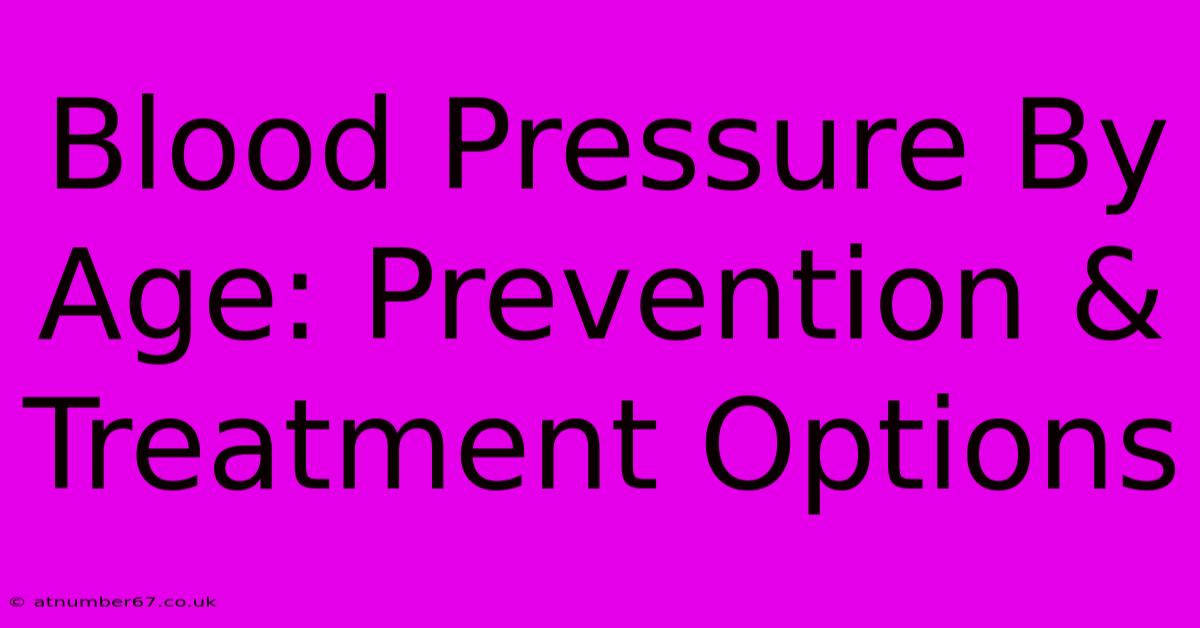Blood Pressure By Age: Prevention & Treatment Options

Table of Contents
Blood Pressure by Age: Prevention & Treatment Options
Understanding your blood pressure (BP) is crucial for maintaining overall health. Blood pressure changes throughout life, and what's considered normal varies with age. This comprehensive guide explores blood pressure by age, preventative measures, and available treatment options.
What is Blood Pressure?
Blood pressure is the force of your blood pushing against the walls of your arteries. It's measured in millimeters of mercury (mmHg) and expressed as two numbers: systolic and diastolic. Systolic pressure (the top number) measures the pressure when your heart beats, while diastolic pressure (the bottom number) measures the pressure when your heart rests between beats.
Blood Pressure by Age Group
Optimal blood pressure levels vary slightly depending on age and individual health conditions. However, the general guidelines are as follows:
Children and Adolescents (Under 18)
Blood pressure norms for children and adolescents are complex and depend on factors like height, weight, and gender. Regular check-ups with a pediatrician are essential to monitor BP and identify any potential issues early. High blood pressure in children is rare but can be serious. Lifestyle changes focusing on healthy eating, regular exercise, and limiting screen time are crucial for preventative health.
Adults (18-64)
For adults aged 18-64, a blood pressure reading below 120/80 mmHg is considered ideal. Readings between 120/80 mmHg and 139/89 mmHg indicate prehypertension, signaling a need for lifestyle modifications. Readings of 140/90 mmHg or higher are considered hypertension (high blood pressure) and necessitate medical attention.
Older Adults (65 and Over)
Blood pressure guidelines differ slightly for older adults (65 and over). While a blood pressure reading below 120/80 mmHg remains ideal, some healthcare providers may accept slightly higher readings for older adults if they are otherwise healthy and have no other significant health conditions. However, consistent high blood pressure remains a major health concern regardless of age. It is crucial to work with a doctor to determine the appropriate target blood pressure.
Prevention of High Blood Pressure
Many lifestyle factors contribute to high blood pressure. Fortunately, many are modifiable, allowing for effective prevention:
Lifestyle Modifications for Blood Pressure Control:
- Diet: Adopting a balanced diet rich in fruits, vegetables, whole grains, and lean protein is crucial. Reduce sodium intake significantly, as high sodium contributes to fluid retention and increased blood pressure. Limit processed foods, sugary drinks, and saturated fats. The DASH diet (Dietary Approaches to Stop Hypertension) is often recommended.
- Exercise: Regular physical activity is essential for maintaining a healthy weight and improving cardiovascular health. Aim for at least 150 minutes of moderate-intensity aerobic exercise or 75 minutes of vigorous-intensity exercise per week.
- Weight Management: Maintaining a healthy weight reduces stress on the heart and blood vessels, lowering blood pressure.
- Stress Management: Chronic stress significantly contributes to high blood pressure. Practice stress-reducing techniques such as yoga, meditation, or deep breathing exercises.
- Limit Alcohol Consumption: Excessive alcohol consumption raises blood pressure. Moderate alcohol intake (if at all) is recommended.
- Quit Smoking: Smoking damages blood vessels and increases the risk of heart disease and stroke.
Treatment Options for High Blood Pressure
If lifestyle changes aren't enough to control blood pressure, medication may be necessary. Treatment options include:
- Diuretics: These medications help the body eliminate excess sodium and water, reducing blood volume and blood pressure.
- ACE Inhibitors: These drugs block the production of a hormone that narrows blood vessels.
- Angiotensin Receptor Blockers (ARBs): Similar to ACE inhibitors, ARBs block the effects of angiotensin, relaxing blood vessels.
- Beta-Blockers: These medications slow the heart rate and relax blood vessels.
- Calcium Channel Blockers: These drugs relax blood vessels by interfering with calcium's role in muscle contraction.
Note: Medication should only be taken under the guidance of a healthcare professional. They will determine the appropriate dosage and medication based on your individual needs and health status.
Conclusion
Managing blood pressure effectively requires consistent effort and monitoring. Regular blood pressure checks, lifestyle modifications, and adherence to prescribed medication (if necessary) are vital for maintaining cardiovascular health and preventing serious complications. Consult your doctor for personalized advice and guidance on maintaining healthy blood pressure throughout your life. Early detection and management of high blood pressure significantly reduce the risk of heart disease, stroke, and other related health problems. Remember, your health is your responsibility, and proactive steps today ensure a healthier tomorrow.

Thank you for visiting our website wich cover about Blood Pressure By Age: Prevention & Treatment Options. We hope the information provided has been useful to you. Feel free to contact us if you have any questions or need further assistance. See you next time and dont miss to bookmark.
Featured Posts
-
Charles Leclercs Net Worth The Formula For Success
Mar 31, 2025
-
Harper Beckham S Secret To A Happy Family Life
Mar 31, 2025
-
How Old Is Pj Patterson The Definitive Answer
Mar 31, 2025
-
Endricks Wife Her Age And Inspiring Story
Mar 31, 2025
-
Charles Manson S Son The Truth Behind The Legend
Mar 31, 2025
